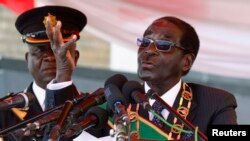The United States has rejected a call by southern African leaders to lift economic sanctions against Zimbabwean President Robert Mugabe and his aides.
U.S. State Department spokeswoman Jen Psaki said Monday the U.S. program of what it calls "targeted" sanctions will remain in force as long as "serious flaws" persist in Zimbabwe's electoral process.
The Southern African Development Community (SADC) urged Western powers to remove all sanctions on Zimbabwe, at the 15-nation bloc's annual meeting in Malawi on Sunday.
The SADC said Zimbabwe has made progress in political reform by staging a July 31 election that the regional bloc called "free and peaceful." Election results gave Mugabe's ZANU-PF party a landslide victory, setting the stage for him to extend his 33 years in power by another five years.
The main opposition MDC party of outgoing Prime Minister Morgan Tsvangirai accused Mugabe's party of stealing the election through "monumental" fraud. SADC observers also noted irregularities in the election and were analyzing them further.
Mugabe-appointed judges of Zimbabwe's highest court are expected to reject all challenges to the results on Tuesday, enabling him to be inaugurated by Thursday.
State Department spokeswoman Psaki said the election did "not represent a credible expression of the will of the Zimbabwean people. " She said a change in the U.S. sanctions policy would occur "only in a context of credible, transparent, peaceful reforms" that reflect the public's wishes.
Malawi's President Joyce Banda, who chaired the SADC summit, said Zimbabweans have "suffered enough" from Western sanctions. The Zimbabwean government has long complained that the sanctions hurt ordinary people.
Psaki said the United States "always is concerned" by the suffering of the Zimbabwean people. But she said "that is how we make our decisions."
Washington began imposing sanctions on Mugabe and his inner circle in 2001, barring them from U.S. travel and banning transfers of defense items to them.
In the same period, the United States has maintained humanitarian assistance to the Zimbabwean people through HIV/AIDS prevention and democracy and governance programs.
The European Union has imposed a travel ban and other sanctions on Mugabe and senior ruling party figures since 2002 in response to alleged rights abuses committed under his authoritarian rule.
EU governments had welcomed Zimbabwe's adoption of a new constitution in March this year, lifting sanctions on some Mugabe loyalists and their companies as a reward for what it called a significant step toward democracy. The United States made a similar gesture in April, suspending sanctions against two Zimbabwean banks.
But the European Union joined Washington in expressing concern about irregularities in the July 31 vote.
U.S. State Department spokeswoman Jen Psaki said Monday the U.S. program of what it calls "targeted" sanctions will remain in force as long as "serious flaws" persist in Zimbabwe's electoral process.
The Southern African Development Community (SADC) urged Western powers to remove all sanctions on Zimbabwe, at the 15-nation bloc's annual meeting in Malawi on Sunday.
The SADC said Zimbabwe has made progress in political reform by staging a July 31 election that the regional bloc called "free and peaceful." Election results gave Mugabe's ZANU-PF party a landslide victory, setting the stage for him to extend his 33 years in power by another five years.
The main opposition MDC party of outgoing Prime Minister Morgan Tsvangirai accused Mugabe's party of stealing the election through "monumental" fraud. SADC observers also noted irregularities in the election and were analyzing them further.
Mugabe-appointed judges of Zimbabwe's highest court are expected to reject all challenges to the results on Tuesday, enabling him to be inaugurated by Thursday.
State Department spokeswoman Psaki said the election did "not represent a credible expression of the will of the Zimbabwean people. " She said a change in the U.S. sanctions policy would occur "only in a context of credible, transparent, peaceful reforms" that reflect the public's wishes.
Malawi's President Joyce Banda, who chaired the SADC summit, said Zimbabweans have "suffered enough" from Western sanctions. The Zimbabwean government has long complained that the sanctions hurt ordinary people.
Psaki said the United States "always is concerned" by the suffering of the Zimbabwean people. But she said "that is how we make our decisions."
Washington began imposing sanctions on Mugabe and his inner circle in 2001, barring them from U.S. travel and banning transfers of defense items to them.
In the same period, the United States has maintained humanitarian assistance to the Zimbabwean people through HIV/AIDS prevention and democracy and governance programs.
The European Union has imposed a travel ban and other sanctions on Mugabe and senior ruling party figures since 2002 in response to alleged rights abuses committed under his authoritarian rule.
EU governments had welcomed Zimbabwe's adoption of a new constitution in March this year, lifting sanctions on some Mugabe loyalists and their companies as a reward for what it called a significant step toward democracy. The United States made a similar gesture in April, suspending sanctions against two Zimbabwean banks.
But the European Union joined Washington in expressing concern about irregularities in the July 31 vote.





